Fast hormones, no speed bumps
Detransitioners say life-altering medical treatment came with no safeguards | Part 2
This post brings together edited extracts from the historic detransitioners’ forum hosted on 12 March 2022 by the international parents’ group Genspect and its founder Stella O’Malley, a therapist in Ireland. The presentations by detransitioners were rich and nuanced, with insights that will be new to many people, especially to those who have only heard the activist claim that detransition is vanishingly rare.
I will post further edited extracts from the forum soon. Today’s post covers aspects of medical transition — hormonal and surgical interventions — that do not fit within the celebratory accounts of activists and most mainstream media. Detransitioners recount stories of easy access to cross-sex hormone drugs, a lack of exploratory therapy to discover any unresolved problems masked by gender, unmentioned side-effects, failures in safeguarding and little follow-up by clinicians.
The Genspect webinar was sold out, and the Twitter hashtag #DetransAwarenessDay was trending in the US, Canada and the UK. For details on video from the forum, sign up for Genspect’s mailing service.
Genspect, which went public in June 2021 to speak for the often silenced parents of gender-questioning young people, represents 18 parent organisations in 16 different countries.
Robin, 24, male detransitioner, United Kingdom
“I started hormone replacement therapy myself, I didn't go through a doctor for the first few years. Once I turned 18 I put myself on a [clinic] waiting list. But I’d already been identifying [as trans] and ‘passing’ [as female] for two years. So, I decided, I’m going to do this myself. I know what I want, I'm going to get it, sort of mentality.
“It's as simple as knowing which website you have to go to. There's guides for different countries and shipping costs, and how to get it. I had to use cryptocurrency to get mine, [and parents should know], if your son is a tech wizard, then there's no stopping him, really. A lot of MtFs [who transition from male to female] are tech wizards, myself included.
“There are online pharmacies that sell whatever prescription drug, like Ritalin, it's the grey market. It depends on the country as to how illegal it is. I think in the UK, as long as you're importing from the [European Union], it's not illegal.
“You go on Reddit or 4chan [social media] and just type in, how do I get hormone replacement treatment [cross-sex hormones], and you'll get a list of websites, all the information you could possibly ever want, how to buy cryptocurrency. There are infographics and interactive websites and wikis. You put in your location, it will tell you which pharmacy is the best for you.”
Sinéad, 31, detransitioner, Scotland
“When I initially got my vial, my testosterone, they said, we’re going to give you the whole vial but you're only supposed to inject half. But of course, I was out of my mind. I was like, more testosterone will make me a man quicker. There was no supervision. And then you go for your bloodwork, and they’re, like, everything looks fine — do you want a higher dose, even though your mental health has plummeted?
“On paper [in the medical file] it was, we saw this patient, but in the actual appointment, there was nothing. There was no safeguarding, no care. There was no inspection. I used to go for my blood checks, and [the clinician] would be, like, how's uni going? That was all it was, there was no intense mental health check or talk therapy, it didn't happen.”
Allie, 25, detransitioner, United Kingdom
“I was on Tumblr, I was on Instagram — I knew exactly what to say to get hormones. So, [it was] just like tick, tick, tick — give me the fricking testosterone. I was never diagnosed with gender dysphoria formally. I was never given exploratory therapy [to check for underlying non-gender problems]. There was no mention of sexual trauma, no mention of my upbringing, and how that could have affected things. I had had so many issues with mental health in my life. There were multiple suicide attempts, there was self-harm. They did not contact my [primary care general practitioner).
“At the time, I was so happy that it was so simple. But now I look back and I'm like, what the hell? I was 18 years old, and they just gave me this shit. It's crazy. And you know what — I don't know if this is controversial to talk about in detrans circles — but for the first year or so, I was over the fricking moon. I was like, this is it, this is the answer.”
Limpidă, 24, male detransitioner, America
“I started taking hormones at age 21. I went to Planned Parenthood. They prescribed me oestrogen immediately. They did the bloodwork, but they didn't look at it before they prescribed me.
“They asked me, are you depressed? And I answered honestly, like, yeah, I'm not well, and they said, that's actually a good sign — that's a sign that you are trans and this is right for you.
“I was suicidal, I had issues with my body image, I was smoking a lot of cigarettes and weed, and drinking a lot. I had mentioned my living situation was not fantastic, I was living in filth, and they were, you sound like a perfect candidate.”
Robin
“When I started looking at surgeries, let me tell you, it was kind of an eye-opener. Because the way that it’s presented in popular culture is that you get the functioning genitalia of the opposite sex, but it's not — it's a penile inversion, and it's even worse for the FtM people [who transition from female to male]. This was nothing like what I expected, and I just kind of realised I'm not ever going to be a woman. And from there, I guess, I realised that I don’t need to be one.”
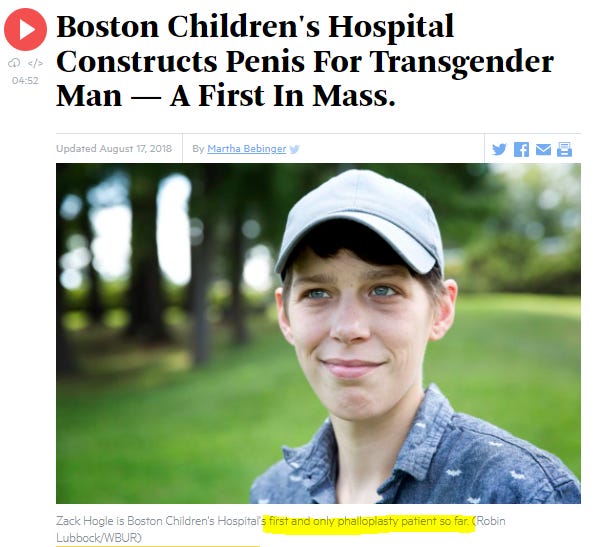
Helena, 23, detransitioner, America
“Planned Parenthood gave me a three-month supply of testosterone. I had a phone call follow-up two weeks after the [first] appointment, but after that I never heard from them again.
“When I was on testosterone, I had a very bad reaction to it. It gave me some really terrible mental health symptoms that actually put me in danger to myself and others. I was hospitalised twice over this. I probably interacted with ten different psychiatrists, during the years that I was trans, and nobody ever brought up that, oh, okay, you’re an 18-year-old girl on 100mg a week of testosterone — maybe this is causing your breakdowns?
“No, they just diagnosed me with a bunch of different mental illnesses, and prescribed different freaking psychiatric drugs. I was in such a bad place.”
Carol, detransitioner, America
“I was having really bad vaginal atrophy [a known side-effect of testosterone]. I went into Planned Parenthood to get care for that, and they said they had never heard of such a thing. They said, we're going to get you some information. And they got me a number for a plastic surgeon to get genital reconstruction surgery. This was not helpful.”
Michelle, detransitioner, America
In 2010, I was prescribed testosterone by a general practitioner [in Canada using the fast-track ‘informed consent’ model]. In 2010, I definitely did not hear anything about atrophy. [Later] I found out that hysterectomy is recommended if you're going to be on testosterone long-term because it does horrible things to your uterus basically.
Robin
“I was trying to live ‘stealth’ [going undetected as trans], and I had a habit of wearing jeans. So, it's common for MtF people [from male to female] to sort of ‘tuck’ their genitalia. It’s like how we use the word ‘bottom surgery’ to hide the fact that it's a penile inversion. We call it ‘tucking’ to hide the fact that it's crushing [the penis and testicles] for 24 hours a day.
“So, I actually had complications from tucking, where the spermatic cord sort of tied around itself and caused testicular torsion, which cuts off the blood supply to the testicle. I had to have emergency surgery, one horrible Christmas Eve, to get that corrected. If I’d left it any longer, I would have lost my appendage. This is something that I've never seen spoken about on any of the [online] trans forums giving advice about how to tuck.”
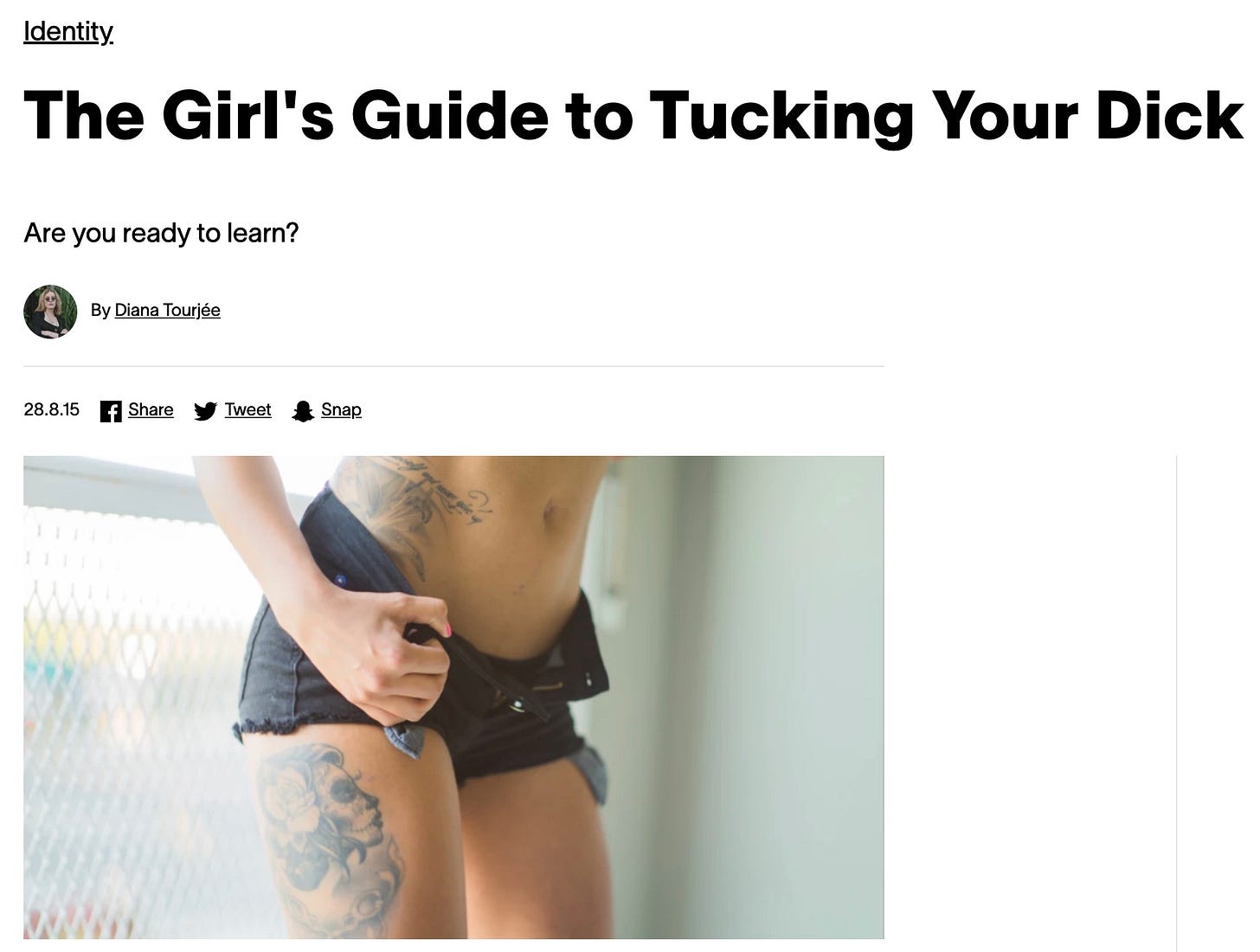
Allie, 22, detransitioner, United Kingdom
“The problem is that the trans ideology narrative is ‘transition or die’. All the time, we see on Twitter, on Tumblr, on TikTok, that if you don't transition, you're going to be depressed, miserable. If trans kids can't get hormones, they're gonna kill themselves. And at that point in my life, when I was just a sad, autistic, lonely little girl, I thought if I don't get these hormones, I'm going be miserable and suicidal forever.
“I think we need a serious rethink of how we market these ideas, because it's leading a lot of girls like me and a lot of boys as well, probably, into thinking that [medical transition] is the only solution for that feeling of being outcasts — and that feeling of, I’m meant to be something that I wasn't born as.”
Michelle
“Activists hinge the importance of making hormones and surgery easily accessible on the high rates of suicidal ideation in trans-identified people. Simultaneously, [the fast-track ‘informed consent’ model promoted by activists] is meant to depathologise the same experience that is causing someone extreme emotional distress. So, how does this make sense? They're coming with extreme emotional distress, but you want to treat it like it's not a mental health problem. That doesn't make any sense. People who are at risk of hurting themselves are a vulnerable population who need to be treated with extra care when it comes to life-altering decisions. Without evaluation and assessment [not required by the informed consent model], a person's decision cannot be fully informed. Dysphoria is a psychiatric condition that can be affected by a number of other health concerns.”
Note: GCN sought comment from the Planned Parenthood Federation of America.



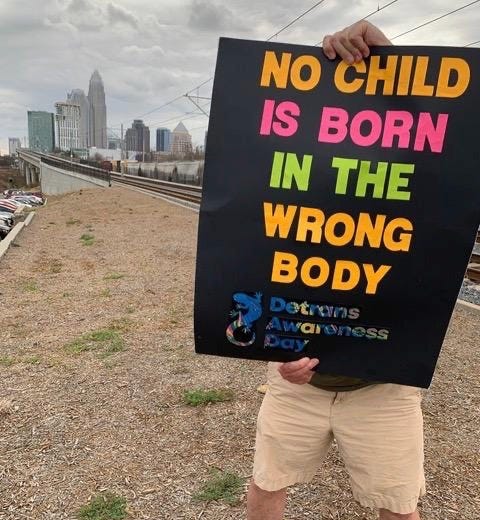
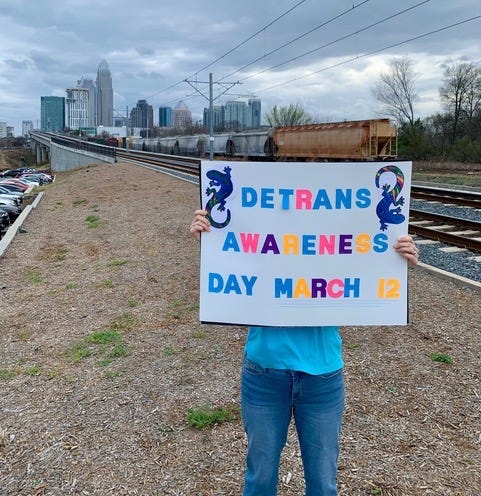
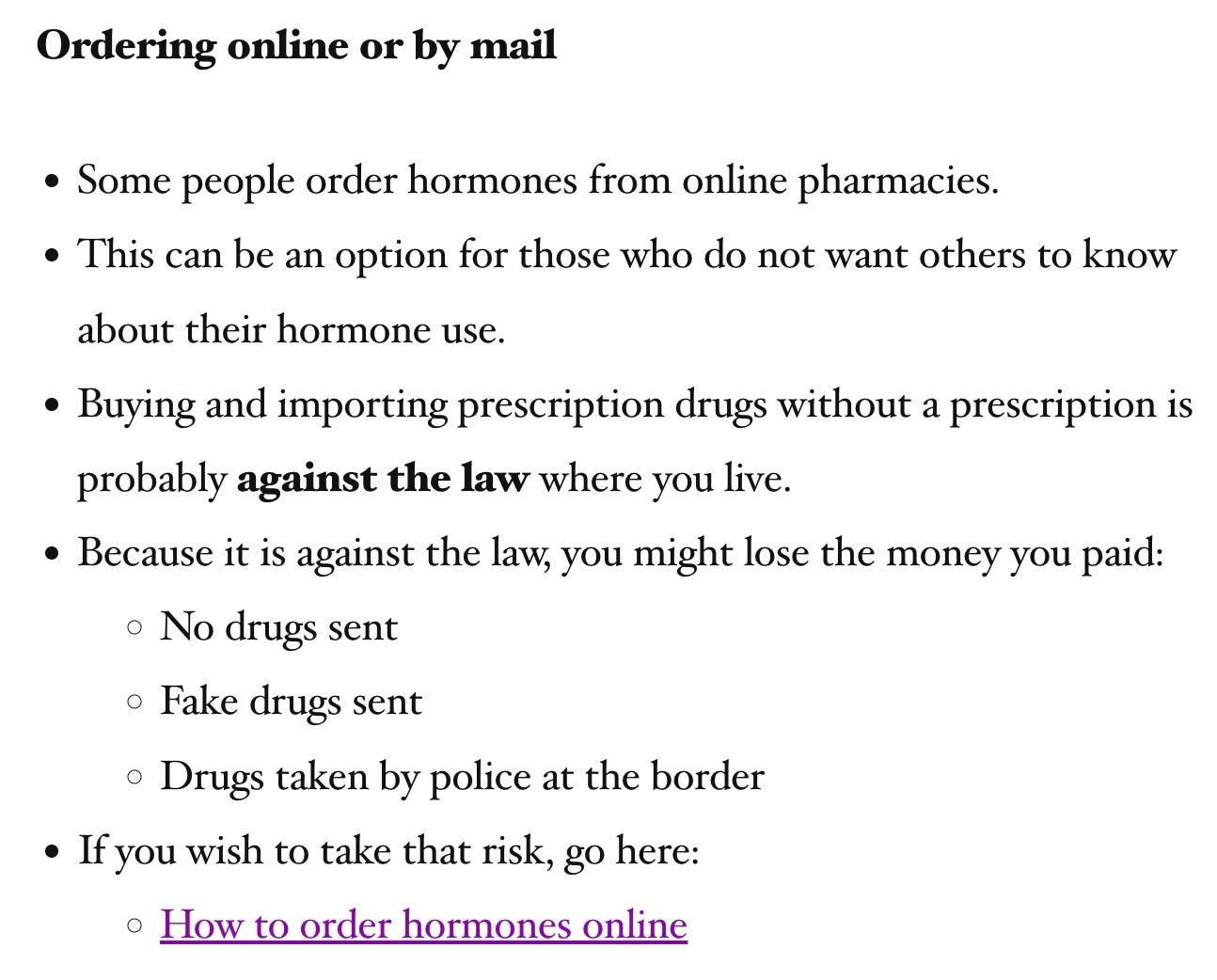


Although you mentioned a couple of boys in this article, one detransitioner interviewed by Graham Linehan made an observation that it may be harder for boys to find the support to detransition than it is for girls. For girls, all the radfems and GC fems are like “we got you” when they want to detransition, but the boys don’t have that so much. Also, my thoughts are that whilst both females and males can behave pretty badly when they do the trans thing, the girls may be forgiven more easily by women in general when they want to detrans. It’s possible that this isn’t a deliberately judgemental thing, but just a ‘comfort zone’ thing.